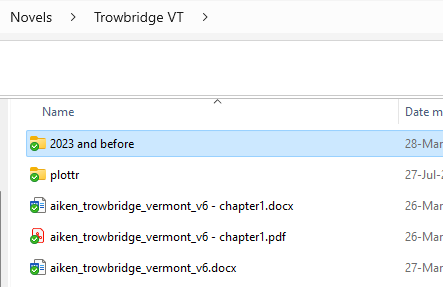No Offramps
looked at my outline on Plottr seeing more green boxes behind me than white boxes in front of me. I hated the ending. Worked all day. Replace the ending, called the novel done and returned to billable work. At present the title of the book is “Ski Branston”. I don’t know that I love the title. “What happens when fraudster’s take over a Vermont ski hill” is a worse title. The folder on my computer is still called “Trowbridge Vermont” which was the title of the first draft.

I researched this story during 2020 with a first draft finished on 28FEB2021. I read badly, developed badly, and I forgot what I was writing. I love writing fiction, yet I spent my days writing the non-fiction-iest stuff on the planet. Stuff I learnt as a kid, I had to hear again from editors and friends.
Whilst crafting “The Little Ambulance War of Winchester County”, I drove hard bring characters to three-dimensional life. I was pleased when I asked a reader/friend, who is your favorite character. She picked Captain Flynn’s wife and Alex’s mother. She is a driving force in the novel, but is never given a name. The irony was that I modelled this character after her, my friend/reader.
I have these sayings I mumble when I get in trouble. I am about to add another one I heard from Neil deGrasse Tyson (via youtube). In describing the movie Oppenheimer, Neil said something about all of these amazing characters in the movie who were never named such as Richard Feynman and Heisenberg. He said that Christopher Nolen “never took an offramp” to explain these people. I knew that they were there because we watch TV and movies with the talkie-talks on (aka “closed captions”, himself with two hearing aids).
- “No Offramps” belongs on my list, thank you Neil.
- “Be in the room”
- “Five senses”
- “Speak your voice”
I also studied the books and movies I was enjoying and listened to a lifetime friend. She said to me, I read for characters and flow, I don’t give a shit about the ending. That kinda resulted in: “Don’t aim for the ending”
When I picked up the draft in 2024, I kept everything and tossed everything out. Both are true. Instead of proving the thesis of an essay and plodding through my normal technical infill needed to lend evidence to an argument, I said, “Just write a story and let the reader in.”
That may mean writing an incomplete story?
My father once described his own writing as “post cinematic.” Under his eye, I wrote a few scenes and essays with this guidance. He said, you do not need to describe Paris and drive by the Eiffel tower to establish setting. Since then 1940s, everyone knows what Paris looks like. They know it in black-and-white. They know it in color. They know the horror of Nazi’s driving down the Avenue des Champs-Élysées. They know the image of mimes and painters along the Seine. All of those images are stored behind the word Paris. The reader sees it. Victor Hugo had to describe Notre Dame to every reader. Melville used a section of a novel to describe the encyclopedia entries for whales. You, he said, need only to describe the faux gas lamps reflecting through a still puddle on a cobblestoned street.
Today’s reader and viewer brings a degree of sophistication to media today including skepticism (I hope) about the role of the artificial.
Invite them in, he said, they’ll join you.
These are lessons I need to remember everyday.